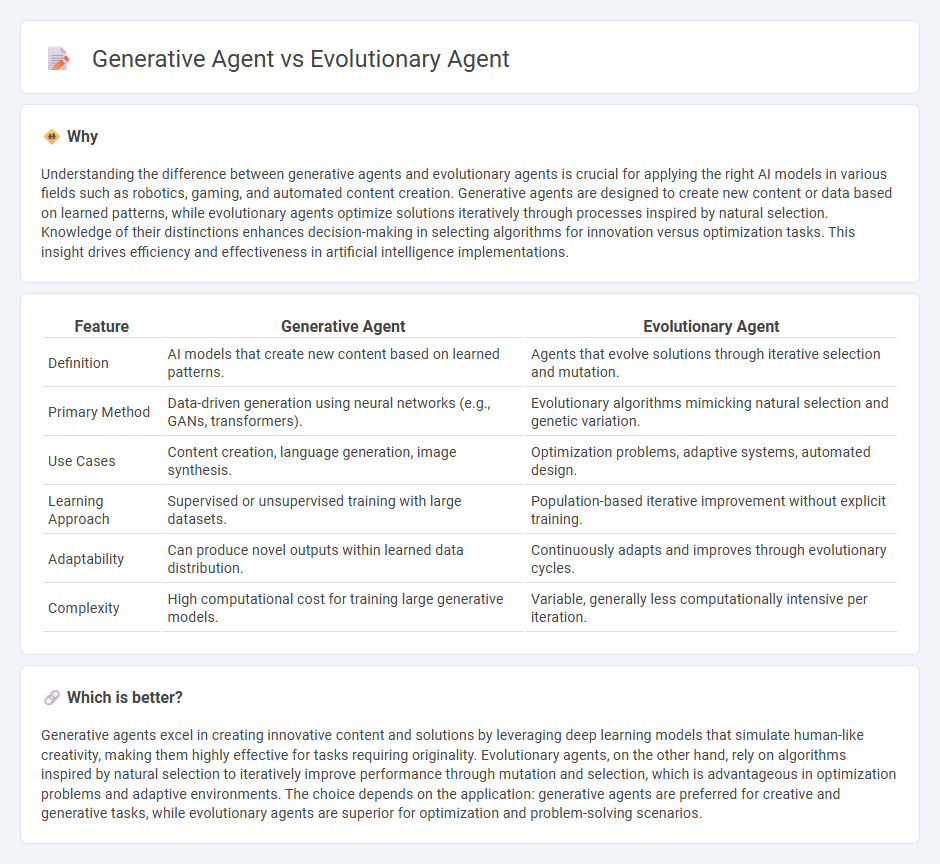
Generative agents leverage machine learning algorithms to create novel content or solutions by understanding patterns and data structures, while evolutionary agents use mechanisms inspired by natural selection to iteratively improve solutions through mutation and selection processes. Generative models excel at producing diverse outputs such as images, text, or music, whereas evolutionary agents focus on optimizing problem-solving strategies over time. Explore further to understand the unique applications and advantages of generative versus evolutionary agents in technology.
Why it is important
Understanding the difference between generative agents and evolutionary agents is crucial for applying the right AI models in various fields such as robotics, gaming, and automated content creation. Generative agents are designed to create new content or data based on learned patterns, while evolutionary agents optimize solutions iteratively through processes inspired by natural selection. Knowledge of their distinctions enhances decision-making in selecting algorithms for innovation versus optimization tasks. This insight drives efficiency and effectiveness in artificial intelligence implementations.
Comparison Table
| Feature | Generative Agent | Evolutionary Agent |
|---|---|---|
| Definition | AI models that create new content based on learned patterns. | Agents that evolve solutions through iterative selection and mutation. |
| Primary Method | Data-driven generation using neural networks (e.g., GANs, transformers). | Evolutionary algorithms mimicking natural selection and genetic variation. |
| Use Cases | Content creation, language generation, image synthesis. | Optimization problems, adaptive systems, automated design. |
| Learning Approach | Supervised or unsupervised training with large datasets. | Population-based iterative improvement without explicit training. |
| Adaptability | Can produce novel outputs within learned data distribution. | Continuously adapts and improves through evolutionary cycles. |
| Complexity | High computational cost for training large generative models. | Variable, generally less computationally intensive per iteration. |
Which is better?
Generative agents excel in creating innovative content and solutions by leveraging deep learning models that simulate human-like creativity, making them highly effective for tasks requiring originality. Evolutionary agents, on the other hand, rely on algorithms inspired by natural selection to iteratively improve performance through mutation and selection, which is advantageous in optimization problems and adaptive environments. The choice depends on the application: generative agents are preferred for creative and generative tasks, while evolutionary agents are superior for optimization and problem-solving scenarios.
Connection
Generative agents rely on artificial intelligence models that create new content or solutions by learning from existing data, while evolutionary agents use algorithms inspired by natural selection to iteratively improve these creations. Both agents are interconnected through their shared goal of optimizing problem-solving and innovation processes by simulating adaptive behaviors and generating novel outputs. The synergy between generative and evolutionary agents enhances advancements in machine learning, robotics, and adaptive systems by combining creativity with iterative refinement.
Key Terms
Adaptation
Evolutionary agents adapt through iterative processes inspired by natural selection, optimizing behaviors over successive generations to enhance survival and task performance in dynamic environments. Generative agents utilize sophisticated AI models to simulate adaptive behaviors by generating context-aware responses, enabling rapid adjustments to new information without extensive retraining. Discover how these adaptive mechanisms impact agent efficiency and application by exploring the latest advancements in artificial intelligence research.
Machine Learning
Evolutionary agents leverage algorithms inspired by natural selection to optimize solutions through iterative mutation and selection processes. Generative agents, on the other hand, utilize deep learning models to create new, data-driven content by understanding and synthesizing patterns within large datasets. Explore the distinctions and applications of these agents in machine learning for deeper insights.
Emergence
Evolutionary agents harness principles from biological evolution, using mechanisms like mutation, selection, and reproduction to achieve adaptive behavior over time. Generative agents simulate human-like behaviors by generating actions based on internal models and social interactions, leading to emergent properties such as complex social dynamics and collaboration. Explore deeper differences in emergent phenomena to understand the potential of each agent paradigm.
Source and External Links
Agent-based evolutionary algorithms: Emerging paradigm or ... - Explores the integration of multi-agent systems with evolutionary algorithms, highlighting how populations of agents can collectively adapt, compete, and exchange information to solve complex problems.
Explaining Evolutionary Agent-Based Models via Principled ... - Investigates how principled simplification of agent-based evolutionary models can enhance explainability, using case studies to show when and why agents evolve successful behaviors in complex environments.
EvoAgent: Towards Automatic Multi-Agent Generation via ... - GitHub - Introduces EvoAgent, a method for automatically extending expert agents into multi-agent systems using evolutionary algorithms, simulating human-like procreation and adaptation across generations.
 dowidth.com
dowidth.com